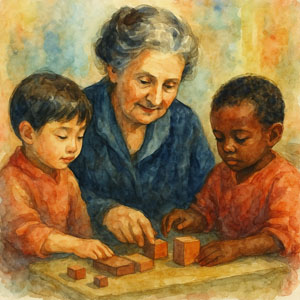— Maria Montessori
 A visionary whose progressive method of education continues to touch the lives of children and teachers throughout the world, Maria Montessori (1870–1952) was born on this day in Ancona, Italy.
A visionary whose progressive method of education continues to touch the lives of children and teachers throughout the world, Maria Montessori (1870–1952) was born on this day in Ancona, Italy.
“One test of the correctness of educational procedure is the happiness of the child,” she once said.
In 1894, she became the first woman in Italy to receive a medical degree.
Working with mentally disabled children, she believed that every child was capable of growth when supported with patience and purpose. She developed an individualized, sensory-based learning approach that celebrated creativity, curiosity, and wonder. Her students learned at their own pace, which nurtured inner confidence and lasting self-esteem.
“To aid life, leaving it free, however, to unfold itself, that is the basic task of the educator,” she said. “Follow the child.”
In January 1907, she opened her first Casa dei Bambini (Children’s House) in Rome’s ghetto for 3–7 year olds. Her success astounded the world. Children thrived in classrooms designed with purpose and beauty, where independence and imagination were treasured as essential tools for development.
Montessori discovered that creativity flourished in a natural and life-supporting environment. Through hands-on exploration and respectful guidance, children blossomed with purpose, clarity, and joy. Her method became a beloved alternative to traditional classrooms, a vision that continues to inspire schools around the globe.
“The first duty of an education is to stir up life, but leave it free to develop,” she said.
 Children hold our future in their hands. 🫶🌟
Children hold our future in their hands. 🫶🌟
